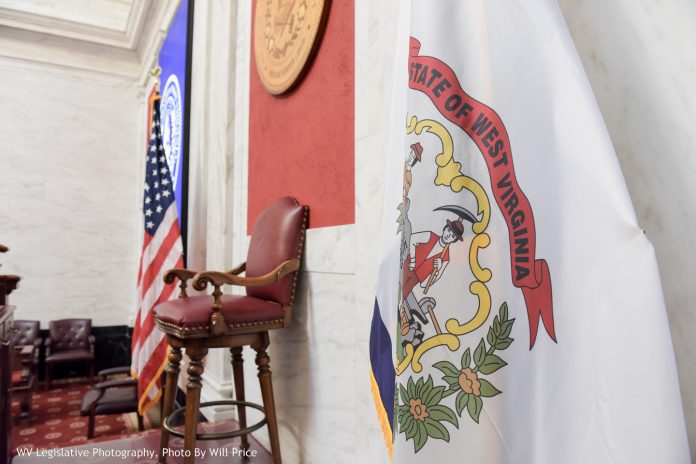As of 6 p.m. Wednesday, March 25th, 2009, the 43rd day of the Regular Session, 758 bills have been introduced in the Senate. Of those, 73 bills have passed and have been sent to the House of Delegates for its consideration. Some bills passed this week were:
Senate Bill 12 would provide an optional two-year registration period for motorcycles. The Division of Motor Vehicles (DMV) would offer this new option until July 1, 2010. This bill also authorizes the DMV to collect one to two full years of registration fees for motorcycles, depending on the length of the registration.
Senate Bill 249 would require the instructional school term to start on August 21 and would provide greater flexibility for county school boards to meet the 180-day requirement for the school year. The bill would also provide for the scheduling of an additional non-instructional days.
Senate Bill 279 would require industrial facilities to report emergency events within 15 minutes to the Mine & Industrial Accident Emergency Operations Center and local emergency services. This would include explosions, fires or chemical releases. After providing the initial report, the facility would provide additional information to appropriate government officials. When the industrial facility determines the affected area to be safe, the facilities would allow relevant government officials access to the area. This bill would impose a penalty of $100,000 for noncompliance. This bill would require the Director of Homeland Security to work with the DEP, the Fire Marshall and the State Emergency Response Commission to identify industrial facilities that do not submit risk management plans to the U.S. EPA.
Senate Bill 280 would repeal the Prison-made Goods Act of 1939 and create the Correctional Industries Act of 2009 to give inmates and juvenile offenders in correctional facilities a realistic work environment, pay prevailing local wages and enable them to acquire marketable skills. The bill would authorize the Commissioner of the Division of Corrections to enter into contracts with private sector entities for inmate labor to be provided through correctional industries. It would be mandatory that all state offices, departments, institutions and agencies purchase products made by correctional industries rather than purchasing the same products from other sources. The Commissioner would create catalogues and a web site containing the articles and products manufactured and would determine costs. The bill would make the sale of inmate made products on the open market a misdemeanor, except for arts and crafts.
Senate Bill 293 would specify the unauthorized practice of medicine as a felony. Upon conviction, persons would be fined up to $10,000 or imprisoned up to five years. The bill would also enhance criminal penalties where serious bodily injury results from such unauthorized practice. The bill defines serious bodily injury as substantial risk of death; prolonged disfigurement and impairment of health; or loss or impairment of a bodily organ. Convicted offenders would be fined up to $20,000 or imprisoned up to 10 years.
Senate Bill 384 would extend authority to the Secretary of Transportation in highway emergencies. The Secretary of Transportation and his or her designated personnel would respond to the incident to assist with the restoration of traffic flow or with the development and implementation of a traffic diversion plan. Once the scene is declared safe, the control of traffic will be transferred to the Department of Transportation or the appropriate law enforcement agency.
Senate Bill 399 would create lifetime hunting, fishing, and trapping license for senior citizens. The Class XS license would cost $15 and no other payments or fees would be issued. Persons 65 years old before January 1, 2010, are grandfathered in.
Senate Bill 489 would allow the Board of Banking and Financial Institutions to receive compensation for travel expenses. The board meets at least once in each calendar quarter although the commissioner can call additional board meetings with at least 24 hours notice. Members would be reimbursed for all reasonable actual expenses for attending meetings in accordance with the regulations of the State Purchasing Division.
Senate Bill 497 would designate the West Virginia Partnership to Promote Community Well-Being, as the single state planning authority for substance abuse prevention, intervention and recovery. The Partnership would establish a data-gathering system to monitor the social and financial impact of substance abuse in West Virginia. The Partnership would review state laws and rules that control drug and alcohol policies and make recommendations for legislation corresponding to the long-term substance abuse strategic plan.
Senate Bill 501 would prohibit animal euthanization by means of a gas chamber. This bill would allow any county that has a gas chamber in operation to continue to do so if it is operated by a certified animal euthanasia technician The gas chamber would also have to be manufactured, installed and serviced by a legitimate company.
Senate Bill 535 would allow municipalities and county commissions to set the closing times for bars to 2:00 a.m. This bill would require a county to designate the time to cease selling, giving or dispensing alcohol in bars within the area of the county, not within the limits of a municipality. Only a municipality could designate the time to cease selling, giving or dispensing alcohol in bars within the corporate limits of the municipality. This bill does not include racetracks.
Senate Bill 647 would allow any Class IV municipality, town or village to adopt an ordinance to authorize early voting for municipal elections by mail. A ballot packet would be mailed to every registered voter in that municipality at least three weeks before Election Day. The packet would include a secrecy envelope and detailed instructions, including how to properly mark the ballot and return it in the return envelope. Each ballot must be mailed or brought to the municipal precinct by the close of the early voting period.

